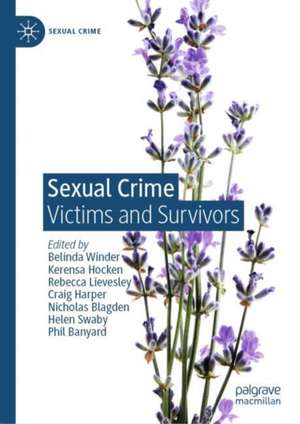Sexual Crime: Victims and Survivors: Sexual Crime
Editat de Belinda Winder, Kerensa Hocken, Rebecca Lievesley, Craig Harper, Nicholas Blagden, Helen Swaby, Phil Banyarden Limba Engleză Hardback – 2 mai 2024
This book offers an original contribution drawing together literature, research, practitioner and service user perspectives around the victimology of sexual crime and offending. Texts about sexual crime focus on the perpetration of sexual crime. This is important as, if we know how, why and in what situations people commit abuse, it will help us prevent further suffering. However, it is important that the voices of people who have experienced sexual abuse are heard and understood, as there is much we can learn from them - not simply about their experiences but improving our knowledge of victimisation also informs how we prevent sexual crime.
Preț: 783.05 lei
Preț vechi: 954.93 lei
-18% Nou
Puncte Express: 1175
Preț estimativ în valută:
149.86€ • 155.87$ • 123.71£
149.86€ • 155.87$ • 123.71£
Carte tipărită la comandă
Livrare economică 14-28 aprilie
Preluare comenzi: 021 569.72.76
Specificații
ISBN-13: 9783031466250
ISBN-10: 303146625X
Ilustrații: XVII, 249 p. 5 illus., 4 illus. in color.
Dimensiuni: 148 x 210 mm
Greutate: 0.47 kg
Ediția:2024
Editura: Springer International Publishing
Colecția Palgrave Macmillan
Seria Sexual Crime
Locul publicării:Cham, Switzerland
ISBN-10: 303146625X
Ilustrații: XVII, 249 p. 5 illus., 4 illus. in color.
Dimensiuni: 148 x 210 mm
Greutate: 0.47 kg
Ediția:2024
Editura: Springer International Publishing
Colecția Palgrave Macmillan
Seria Sexual Crime
Locul publicării:Cham, Switzerland
Cuprins
Chapter 1: Lost, Gaslit, Belittled, Tormented: LGBT+ Experiences of Domestic and Sexual Abuse.- Chapter 2: Bringing survivor involvement into the mainstream.- Chapter 3: Sexual abuse, safeguarding and prevention in sport.- Chapter 4: Male Rape: Prevalence, consequences, and myths.- Chapter 5: Surviving Sexual Abuse cloaked in Spiritual Abuse.-Chapter 6: Preventing & Responding To Campus Sexual Abuse.- Chapter 7: The Voice of Dual Status.- Chapter 8: Circles of Support and Accountability: Restorative Outcomes for the Survivor Volunteer.- Chapter 9: ‘How could you be so stupid?’: Understanding the experience of partners of people who have been convicted of a sexual offence.- Chapter 10: Achieving a More Informed Understanding of Sexual Abuse through working with Perpetrators, as well as Survivors.
Notă biografică
Professor Belinda Winder is the Research Director of the Centre for Crime, Offending, Prevention and Engagement at Nottingham Trent University. She is a co-founder of the Safer Living Foundation charity and has won numerous awards for her work to prevent sexual crime.
Kerensa Hocken is a registered forensic psychologist at HMPPS Whatton, UK. She has oversight for the assessment and treatment of people in prison for sexual offending in the Midlands region.
Dr. Rebecca Lievesley is an Associate Professor in Psychology at Nottingham Trent University. Her research focuses on the prevention of sexual abuse, with key strands related to work with non-offending populations with self-identified paedophilia, and the evaluation of the use of medication to manage problematic sexual arousal for individuals convicted of a sexual offence.
Dr. Craig Harper is an Associate Professor in Psychology at Nottingham Trent University. His research interests lie in the psychological processes that underpin decision-making in relation to controversial social and political topics, such as how people form and express attitudes towards people with sexual convictions and atypical sexual interests and behaviours.
Helen Swaby is a Senior Lecturer in Counselling and Psychological Therapies at Nottingham Trent University. She is a qualified integrative psychotherapist and has a background in forensic psychology research.
Phil Banyard is an Emeritus Professor at Nottingham Trent University. He was honoured with the British Psychological Society’s Award for Distinguished Contributions to Psychology Education.
Textul de pe ultima copertă
This book offers an original contribution drawing together literature, research, practitioner and service user perspectives around the victimology of sexual crime and offending. Texts about sexual crime focus on the perpetration of sexual crime. This is important as, if we know how, why and in what situations people commit abuse, it will help us prevent further suffering. However, it is important that the voices of people who have experienced sexual abuse are heard and understood, as there is much we can learn from them - not simply about their experiences but improving our knowledge of victimisation also informs how we prevent sexual crime.
Belinda Winder is Professor of Forensic Psychology and Head of the Sexual Offences, Crime and Misconduct Research Unit at Nottingham Trent University, UK. She is a co-founder of the Safer Living Foundation charity.
Kerensa Hocken is a registered forensic psychologist at HMPPS Whatton, UK. She has oversight for the assessment and treatment of people in prison for sexual offending in the Midlands region.
Rebecca Lievesley is Senior Lecturer in Psychology at Nottingham Trent University, UK and has conducted research within the criminal justice system for many years.
Craig Harper is Senior Lecturer in Psychology at Nottingham Trent University, UK. He specializes in topics related to forensic and political psychology.
Nicholas Blagden is Associate Professor and co-leads the Sexual Offences, Crime and Misconduct Research Unit at Nottingham Trent University, UK. He is a co-founder of the Safer Living Foundation charity.
Helen Swaby is Lecturer in Counselling at Bishop Grosseteste University, UK. She is a qualified integrative psychotherapist and has a background in forensic psychology research.
Phil Banyard is Head of Psychology at Nottingham Trent University, UK. He was honoured with the British Psychological Society’s Award for Distinguished Contributions to Psychology Education.
Caracteristici
Brings together perspectives around the victimology of sexual crime and offending Highlights instances of dual status (victim and perpetrator) Explores sexual crime in a almost completely unexplored area






